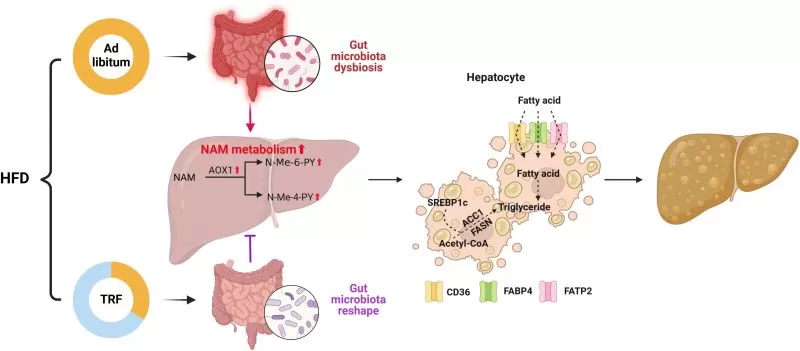Intermittent Fasting: Metabolic and Gut Microbiota Insights for Fatty Liver Management
NAFLD: A Growing Metabolic Disorder with Significant Health Implications
Non-alcoholic fatty liver disease (NAFLD) is a common condition where fat accumulates in the liver. It affects about 25% to 30% of people worldwide, and its occurrence is expected to rise due to modern sedentary lifestyles and overeating. NAFLD can range from simple fat buildup to more severe issues like liver inflammation, cirrhosis, and liver cancer. It also increases the risk of heart disease, type 2 diabetes, and kidney problems, posing a serious health threat. Currently, there are no FDA-approved treatments specifically for NAFLD, so managing the disease relies on lifestyle changes and preventing complications.
The Role of Time-Restricted Feeding in Metabolic Health and NAFLD Prevention
Intermittent fasting (IF) has become popular for its benefits in treating metabolic disorders, cancer, and heart disease. One common IF approach is time-restricted feeding (TRF), where people eat only within a set time each day, such as the 16:8 method, which involves 8 hours of eating followed by 16 hours of fasting. Studies in humans and animals show that TRF helps improve metabolism and protect against NAFLD. Besides aiding in weight loss, TRF may offer additional heart and metabolic health benefits. Understanding how TRF works could lead to new treatments for NAFLD.
The Role of Gut Microbiota in NAFLD
Gut microbiota imbalance is a key factor in the development of non-alcoholic fatty liver disease (NAFLD). People with NAFLD have different gut bacteria compared to healthy individuals, which may worsen liver fat, scarring, and inflammation. Time-restricted feeding (TRF) has been found to improve gut health by increasing beneficial bacteria and restoring normal microbial patterns. A recent study even showed that transferring TRF-related gut bacteria to mice could reduce liver disease, suggesting that changes in gut bacteria might contribute to the health benefits of TRF. However, the exact reasons behind this are still unclear.
Metabolic and Microbiota Mechanisms: How TRF Impacts NAFLD
A recent study published in the journal Gut Microbes, titled "Time-restricted feeding ameliorates non-alcoholic fatty liver disease through modulating hepatic nicotinamide metabolism via gut microbiota remodeling," (article resource) explored the effects of a 16:8 time-restricted feeding (TRF) regimen on a mouse model of non-alcoholic fatty liver disease (NAFLD) induced by a high-fat diet. Metabolomic and metagenomic analyses revealed that TRF alleviates NAFLD through several mechanisms, including downregulation of aldehyde oxidase 1 (AOX1) expression in the liver, inhibition of excessive fat production, and restoration of hepatic lipid metabolism. Fecal microbiota transplantation was able to mimic these effects, suggesting that TRF offers protective benefits against NAFLD. Overall, this study provides promising insights for the prevention and treatment of NAFLD.

Partnering with MetwareBio for Advanced Multi-Omics Solutions
MetwareBio had offered the Metagenome sequencing and TM widely-targeted metabolomics services for this research. MetwareBio is a leading CRO specializing in innovative multiomics technologies for life sciences and health research. We are committed to delivering high-quality data and understand the unique aspects of each project. MetwareBio provides customized metabolomics, proteomics, and multi-omics analysis services to meet a wide range of needs. Our workflows are designed to handle projects of all sizes, from small-scale studies to large population research. With over 4000 projects completed, we have a proven track record of delivering dependable results. At MetwareBio, we work closely with researchers, offering support from sample extraction to data analysis to ensure precise and efficient achievement of research objectives. Feel free to contact us with any inquiries or requirements!
Next-Generation Omics Solutions:
Proteomics & Metabolomics
Ready to get started? Submit your inquiry or contact us at support-global@metwarebio.com.


